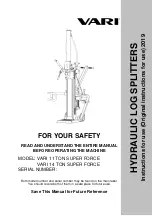
4
Original
Version 1-2011
1.
General information
1.1.
Introduction
The purpose of this manual is to ensure that the machine is used in the manner intended by the
manufacturer with consideration to safety. Every person operating the machine or working in close
proximity to it must carefully study this manual.
Operators of the machine are expected to have basic skills in tractor handling, such as utilising the cardan
shaft drive and the tractor's lifting equipment. Before commencing work, operators must also familiarise
themselves with the machine's control and safety equipment, and ensure their operation.
Additional information on Maaselän Kone Oy's products is available on our website at
Store the manual in the immediate vicinity of the machine.
1.2.
The machine's purpose of use
The Hakki Pilke 1X37 log splitter
is designed for preparing firewood from pruned wood or logs. The log
splitter must not be used to process any treated wood, such as is found in construction waste.
The maximum diameter for wood to be split is 37 cm. This limit may not be exceeded. When estimating
the diameter of the log you are about to cut, note that the shape of the log and other factors, such as
branches or burrs, make the actual diameter larger, and may prevent wood from
being fed into the
machine. The splitting groove is designed for logs up to 60 cm in length. Never cut or split logs that
exceed the maximum length.
1.3.
Machine model and basic information
Model
Normal Tr.
Normal Combi
Easy Tr.
Easy Combi
Drive
Tractor's cardan shaft
Tractor's cardan
shaft/electricity
Tractor's cardan
shaft
Tractor's cardan
shaft/electricity
Weight
750 kg
810 kg
830 kg
890 kg
TR/Electrical
drive
min 20 hp/480 rpm
20 hp/7.5 kW
(min 20 A fuse)
min 25 hp/480 rpm
25 hp/10 kW
(min 25 A fuse)
Height/width/le
ngth
in
the
transport
position
2630/1150/2480
(mm)
2630/1150/2480
(mm)
2,630/1,280/2,480
(mm)
2,630/1,280/2,480
(mm)
Input/output
conveyor
2200/4,000 (mm)
2200/4,000 (mm)
2200/4,000 (mm)
2200/4000
(mm)
Blade flange
Blade chain
16” groove 1.5 mm
66 loops, pitch 0.325”
16” groove 1.5 mm
66 loops/ 0.325”
16” groove 1.5 mm
66 loops/ 0.325”
16” groove 1.5 mm
66 loops/ 0.325”
Max
wood
diameter
37 cm
37 cm
37 cm
37 cm
Max
wood
length
max 60 cm; min 20 cm
60 cm/20 cm
60 cm/20 cm
60 cm/20 cm






























